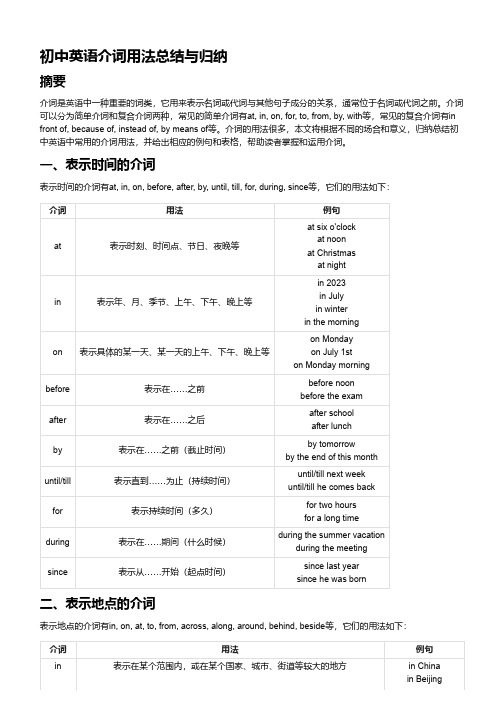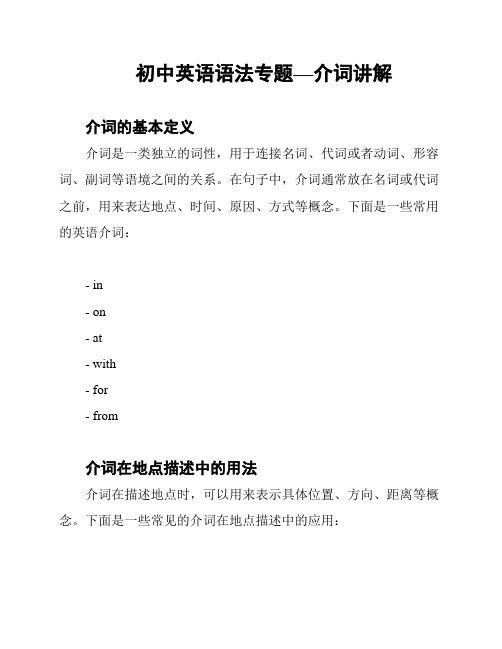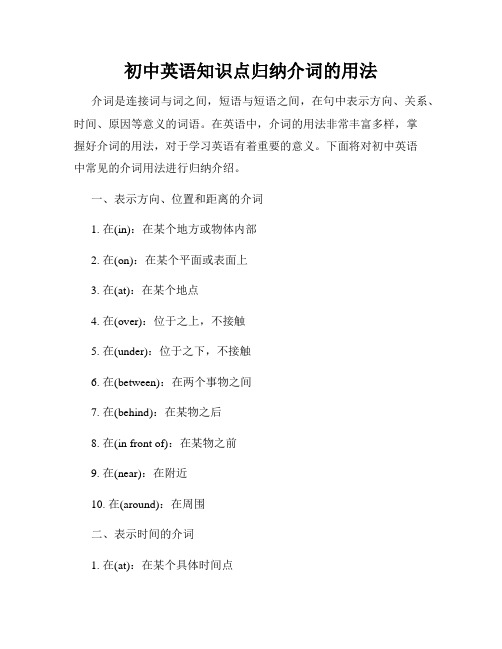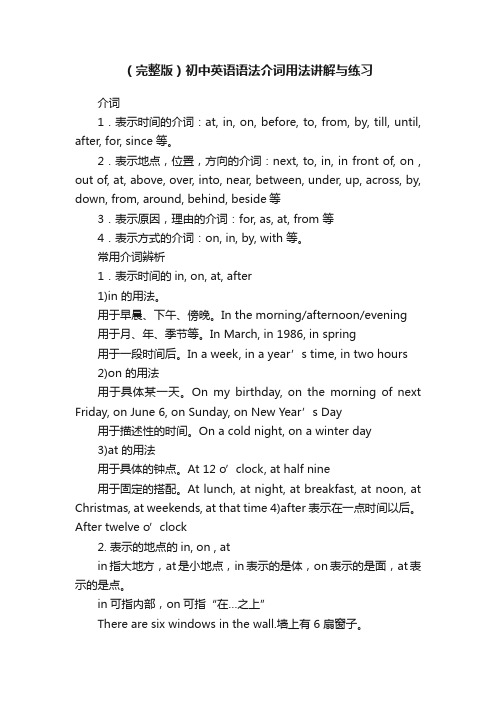初中英语介词讲解
初中英语介词用法总结与归纳

初中英语介词用法总结与归纳摘要介词是英语中一种重要的词类,它用来表示名词或代词与其他句子成分的关系,通常位于名词或代词之前。
介词可以分为简单介词和复合介词两种,常见的简单介词有at, in, on, for, to, from, by, with等,常见的复合介词有in front of, because of, instead of, by means of等。
介词的用法很多,本文将根据不同的场合和意义,归纳总结初中英语中常用的介词用法,并给出相应的例句和表格,帮助读者掌握和运用介词。
一、表示时间的介词表示时间的介词有at, in, on, before, after, by, until, till, for, during, since等,它们的用法如下:介词用法例句at表示时刻、时间点、节日、夜晚等at six o'clock at noonat Christmas at nightin表示年、月、季节、上午、下午、晚上等in 2023in Julyin winterin the morningon表示具体的某一天、某一天的上午、下午、晚上等on Mondayon July 1ston Monday morningbefore表示在……之前before noon before the examafter表示在……之后after school after lunchby表示在……之前(截止时间)by tomorrowby the end of this monthuntil/till表示直到……为止(持续时间)until/till next week until/till he comes backfor表示持续时间(多久)for two hours for a long timeduring表示在……期间(什么时候)during the summer vacation during the meetingsince表示从……开始(起点时间)since last year since he was born二、表示地点的介词表示地点的介词有in, on, at, to, from, across, along, around, behind, beside等,它们的用法如下:介词用法例句in表示在某个范围内,或在某个国家、城市、街道等较大的地方in Chinain Beijing介词用法例句in ZhongshanRoadon表示在某个表面上,或在某个楼层、台阶等较小的地方,或在某个方位上on the wall on the secondflooron the left/rightat 表示在某个具体的位置或地点,或在某个机构、场所等较小的地方,或表示靠近、附近等at the cornerat schoolat the bus stopto表示朝向某个方向或地点,或表示到达某个地点(范围之外)to the east to Japan to schoolfrom表示从某个地点出发或离开(范围之外)from home from Shanghai from Chinaacross表示横穿或穿过(从一边到另一边)across the street across the riveralong表示沿着或顺着(在一边)along the road along the riveraround表示围绕或环绕(在四周)around the lake around the worldbehind表示在……后面behind the door behind himbeside表示在……旁边beside the window beside her三、表示方向的介词表示方向的介词有to, from, into, out of, onto, off, up, down, through等,它们的用法如下:介词用法例句to表示朝向某个方向或地点,或表示目的地He is going to Beijing. She gave the book to me.from表示从某个方向或地点出发或离开,或表示来源He came from the south. This is a gift from my friend.into表示进入某个范围或空间(由外到内)He jumped into the water. She put the flowers into the vase.out of表示离开某个范围或空间(由内到外)He ran out of the room. She took the book out of the bag.onto表示移动到某个表面上(由低到高)He climbed onto the roof. She threw the ball onto the ground.off表示从某个表面上移开(由高到低)He fell off the bike. She took off her hat.up表示向上移动(由低到高)He went up the hill.介词用法例句She climbed up the ladder.down表示向下移动(由高到低)He came down the stairs. She slid down the slide.through表示穿过某个空间或物体(从一端到另一端)He walked through the forest. She looked through the window.四、表示方式、手段、工具的介词表示方式、手段、工具的介词有by, with, in, on等,它们的用法如下:介词用法例句by 表示交通工具、方式、方法等,或表示被动语态的动作执行者,或表示时间的截止点,或表示计量单位等by busby mistakeby himby tomorrowby weightwith 表示使用某种工具、器具、材料等,或表示伴随的人或物,或表示具有某种特征、状态等,或表示原因、理由等with a knifewith hisparentswith long hairwith joyin 表示使用某种语言、文字、颜色等,或表示穿着某种衣服,或表示处于某种状态、情况等,或表示在某种范围内等in Englishin black andwhitein a red dressin a hurryin generalon 表示使用某种电子设备、媒体等,或表示依靠某种力量、条件等,或表示以某种方式等,或表示参与某种活动等on TVon footon fireon dutyon holiday五、表示原因、目的、结果的介词表示原因、目的、结果的介词有for, at, from, of, with, by, because of, owing to, thanks to, out of, through等,它们的用法如下:介词用法例句for 表示原因、理由,常与sorry, famous, punish, praise, thank, blame等连用,也表示目的、意图,常与hope, wish, wait, look, come, go等连用,也可以表示用途、功能等for peacefor helpfor a walkfor funfor cutting paperat表示目的、意图,常与surprised, shocked, amazed, good, bad等连用,也可以表示针对、针对性等at his words at the news at math介词用法例句at solvingproblemsfrom 表示结果、效果,常与different, far, free, safe等连用,也可以表示来源、出发点等from the picturefrom now onfrom dangerfrom birthof 表示原因、理由,常与afraid, proud, sure, tired等连用,也可以表示所属、属性、特征等of the darkof himof the resultof his workwith 表示原因、理由,常与pleased, satisfied, angry, happy等连用,也可以表示伴随、方式、工具等with the answerwith himwith a smilewith a knifeby 表示方式、方法、手段等,也可以表示被动语态的动作执行者,或表示时间的截止点,或表示计量单位等by doing thisby himby tomorrowby weightbecauseof 表示原因、理由,相当于一个从句,后面接名词或代词等because of therainbecause of thatowing to表示原因、理由,相当于一个从句,后面接名词或代词等owing to the trafficjamowing to hisillnessthanks to表示原因、理由,含有感激或讽刺的意味,后面接名词或代词等thanks to yourhelp thanks to his carelessnessout of表示原因、理由,含有出于某种动机或感情的意味,后面接名词或代词等out of curiosity out of pitythrough表示原因、理由,含有经过某种过程或方式的意味,后面接名词或代词等through hard work through a window六、表示对象、范围的介词表示对象、范围的介词有of, for, about, with, to, from, among, between等,它们的用法如下:介词用法例句of表示所属、属性、特征等,也可以表示分离、脱离等the color of the skya cup of teaa friend of mineget rid of itfor表示目标、对象、受益者等,也可以表示目的、原因等 a gift for youa seat for twoa doctor for the poora room for rentabout表示主题、内容、话题等,也可以表示大约、左右等a book about history tell me about yourself about ten minuteswith表示伴随、陪同等,也可以表示方式、工具等stay with mea man with glasses speak with a loud voice cut it with a knifeto表示方向、目的地等,也可以表示对象、接受者等go to school fly to London say hello to him give it to herfrom表示来源、出发点等,也可以表示对象、对比者等come from Chinaa letter from my father different from youlearn from himamong表示在三个或三个以上的人或物之间(内部)share it among yourselves a flower among the grassbetween表示在两个人或物之间(内部或外部)sit between thema river between two mountains七、其他常用的介词除了上述介词外,还有一些其他常用的介词,如as, like, except, without, beyond, above, below, over, under等,它们的用法如下:介词用法例句as表示身份、职业、角色等,也可以表示方式、方法、程度等as a teacher as usual as you know as well aslike表示相似、类似等,也可以表示喜欢、喜爱等like a birdlike father, like sonI like music.except表示除……之外(不包括)everyone except me every day except Sundaywithout表示没有、缺少等without money without water without a wordbeyond表示超出、超过等beyond the wall beyond my expectation beyond controlabove表示在……之上(不接触)above the ground above sea levelabove allbelow表示在……之下(不接触)below the surface below zero below averageover表示在……之上(覆盖或接触)over the bridge over his head over the phoneunder表示在……之下(覆盖或接触)under the tree under his arm under the weather。
初中英语中考语法知识介词分类讲解(共18类)

中考英语介词分类讲解一、表示方位in:在某块更大地域的内部on:两块地接壤, 挨着to:两块地不接壤, 中间隔着【例】上海位于中国的东部.Shanghai is in the east of China.(上海是中国境内的一座城市, 处于中国内部)广东在广西的东南边.Guangdong is on the southeast of Guangxi.(广东与广西挨着, 两块地域相邻)台湾在福建省的东南面.Taiwan is to the southeast of Fujian.(台湾与福建隔海相望, 中间并不接壤, 隔得较远)east东south南west西north北①以上4个方位词既是名词(n.),又是副词(adv.)②两两组合, 就可以组成:东南southeast、东北northeast、西南southwest、西北southnorth另4个方向.【例】向西走用名词:go to the west(west属于特指, 前面必须加定冠词the)所有特指的名词前面都要加the, 比如太阳☀️只有一个, 使用时-the Sun, 同理月亮 -theMoongo是不及物动词(vi),后面跟名词必须要加介词to(不清楚及物动词/不及物动词的小伙伴, 请跳转 :【笔记】英语语法入门到精通(17)| 动词之:及物动词&不及物动词)用副词:go west(这里副词west修饰动词go)【例】向西走10米.go west/ go to the west ___ 10 meters.根据之前的结构判断原则, 10米属于名词, 前面的结构是完整的, 只不过省略了主语.go west是谓语+adv.,这里可以看成是主谓+adv., 结构完整.go to the west中, go是谓语, 介词to和名词the west共同构成介词短语, 整体也可看成主谓+介词短语, 结构完整.剩下的10meters是名词, 而完整的句子结构后面只能是adv./介词短语, 因此空行里一定是介词.答案:go west/ go to the west for 10 meters.二、表示上下↑在....上:over、above、on↓在....下:beneath、under、below①正上-正下:over-underover还有覆盖在某物体上面的意思, 也属于接触面, 但注意和on的区别, on只表示在物体表面, 没有覆盖的意思.②非正上-非正下:above-below不强调正上方/正下方时, 只要是上/下方都可以用.③表面上-表面下:on-beneath【例】你头顶正上方有一幅画.There is a painting over your head.树下面有一只大象 .There is an elephant under the tree.树上有很多苹果.There are many apples on the tree.(苹果是长在树上 的, 属于接触表面)地下有很多文物.There are a lot of antiques beneath the ground.(也可以用underground一个词表示“地下”)飞机 在云层上飞行.The plane flew above the clouds.气球在房子 上方10米处.A balloon is 10 meters above the house.(可以加具体数量词精确描述)请把你的名字写在下面.Please write your name below.三、表示前后前:in (the)front of/before后:in/at(the)back of/behind【例】那辆车在我的后面.The car is in back of me.The car is at back of me.The car is behind me.(更常用这句)我们在这座雕像前拍照吧.Let's take a photo in front of/before the statue.他坐在教室里的前面.He sits in the front of the classroom.他坐在车里的后面.He sits in the back of the car.He sits at the back of the car.四、表示附近/周围周围:around附近:near旁边:by/beside/next to【例】我手边有一支笔.There is a pen next to/beside my hand.电话在窗户旁边.The telephone is by the window.书在柜子边.The book is beside the cabinet.小狗绕着我跑.The dog ran around me.老师住在我家附近.My teacher lives near my home.五、表示中间两者之间:between在许多东西中间(3个及以上):among在许多东西的正中间(3个及以上):in the middle of【例】他坐在我和Tom的中间.He sits between me and Tom.他们在人群中行走.They walked among the crowds.他在那群人中很优秀.He is outstanding among those people.他正站在人群的正中央.He is standing in the middle of the crowd.六、表示穿越/穿过横穿:across(随随便便地穿过去)从物体内部穿过:through(水从水管流过)从物体上方穿过:over(跨栏杆)从物体旁边穿过:pass/by【例】这条小路穿过一片树林.The path goes through a wood.(小路是从树林里穿过)透过这扇窗, 你能看到一座教堂.Through the window, you can see a church.(through还可以表示目光穿过)我能隔墙听到他们交谈.I can hear their talk through the wall.(through还可以表示透过...听到声音)你穿过这道大门, 就看到左面的房子了.Go through this gate, and you'll see the house on your left.(人走过大门, 也是内部穿过)( 注意:这句话由2个简单句组成,中间逗号隔开, 并用and连接)他独自一人穿越了沙漠.He went across the desert alone.(alone这里做副词)飞机飞过了一座城市.The plane flew(fly过去式) over a city.他跳过了篱笆.He jumped over the fence.我经过了你的家.I passed your home.七、instead / instead of表示代替/而是instead-副词(adv.)instead of-介词【例】他没买手机, 而是买了电脑.① He didn't buy a phone instead of buying a laptop.(1句话)instead of是介词, 后面原本要加名词, 但buy是动词, 放在介词后面要变成ing形式(即动词+ing做为名词成分, 属于非谓语动词的一种, 后面会细讲, 记得关注哦~)句子结构分析:He didn't buy a phone.是一套完整的主谓宾,后面可以直接加介词短语/副词, instead of 是介词, 后面要加名词, 把动词buy变ing形式, 变成名词.② He didn't buy a phone.He bought a laptop instead.(2个简单句)同理, 前后2句都是完整的主谓宾,instead是副词, 原句意是买电脑替代了原本要买的手机, 所以instead放在第2句里.洗淋浴吧, 别用浴缸了.Take a shower instead of a bath.Don't use the bath.Take a shower instead.八、according to / based onaccording to根据based on以...为基础2个都是介词短语, 在句子里前后都能放.【例】据迈克说, 这是一部很棒的电影.According to Mike, it's a great movie.(放句首要用逗号隔开)根据我的经验, 明天会下雪.It will snow tomorrow according to my experience.(不放句首时不用逗号隔开)本书是根据个人经历写成的.The book is based on personal experience.九、besides / except /except for /apart from表示除了...注意区别:besides如果去掉s,就是beside在...旁边besides-表示除了, 还...., 包括“除了”的那部分, 比如:除了喜欢吃香蕉 , 还喜欢吃苹果.两者仍然都属于“喜欢吃”的范围内.except-仅表示除了...之外, 排除意味更明显.except for-用法同except, 但更强调美中不足的那部分.apart from-besides和except的用法都可以用.【例】除了周末我们每天都工作.We work every day except/apart from weekend.(把周末排除在外)除足球外你还喜欢哪些运动?What other sports do you like besides football?(除了喜欢...还喜欢....)除了英语, 我还喜欢数学.I like math besides/apart from English.你英语很好, 除了一些语法错误.Your English is good except for some grammar mistakes.(美中不足)十、ahead of表示在...前面①不同于03部分的方位介词, ahead of的“前面”更宽泛:方位/时间(提前)/能力(优秀)/名次(领先)...② ahead of前面可以加数量词修饰.【例】有两只猫在我们前面.Two cats are ahead of us.(表示方位,可与 03部分的方位词替换)我在最后期限之前完成了作业.I finished homework ahead of the deadline.我们提前15分钟完成了测验.We finished test 15 minutes(数量/时间) ahead of time.她前程远大.She has a great future ahead of her.(a great表示数量多,程度深)她总是遥遥领先班上的同学.She was always(adv.做状语) ahead of her classmates.十一、as for 表示至于...【例】至于作业, 我明天会完成.As for my homework, I will finish it tomorrow.至于这封信, 我交给他了.As for this letter, I gave it to him.至于其他人, 回家吧.As for the others, go home.十二、of/about/on表示关于...of-比较浅显地提及, 聊到, 顺带提一嘴的感觉about-比of稍深入一点, 日常使用on-比较正式介绍时使用, 偏专业【例】昨天晚上他没有提起他妈妈.He didn't talk about his mother last night.他们谈到即将到来的圣诞节.They talk of the coming Christmas.我没有想(考虑)到成本.I don't think of the cost.我得思考一下这件事.I have to think about this thing.这是一本关于历史的书.This is a book on history.十三、like 表示像...like有2种词性:①表示喜欢时, like是动词【例】我喜欢香蕉和苹果.I(主) like(谓) banana and apple(宾).②表示像...时, like是介词,后面+n./doing(动词的名词形式)/从句.【例】我不喜欢像Tom这样的人.I don't like people like Tom.(第一个like是动词, 第二个是介词)她好像我妈妈.She is like my mother.如果“好像”前面没有主语, 用It's like(that)...., that可加可不加.It's not like...(不像.../跟...不一样)【例】好像她说的是真的.It's like (that) what she said is true.好像是他拿走了我的书.It's like (that) he took my book.你并不爱她.It's not like you love her.和上次不一样.It's not like last time.跟我3年前看到的不一样.It's not like what I saw 3 years ago.十四、as 表示当作...as这里作为介词,表示当作..., 中文意思里和like表示像...相近, 但as的所谓“像”的程度比like更深, 甚至可以理解为"就是...(通常是职业或身份)", 而like仅仅是“相像”.【例】她把我当做朋友一样.She treats me as a friend.(像对待朋友一样对待“我”)你可以把那个玻璃杯当作花瓶用.You can use that glass as a vase.他工作起来像个警察.He works as a police.(几乎就是警察)He works like a police.(只是像, 但并不等于就是警察)十五、in exchange/return/reward for...表示作为....的交换/回报/奖励① in exchange for-作为...的交换【例】我用我的照相机交换他的DVD.I gave him my camera in exchange for his DVD.② in return for-作为...的报答【例】为了报答他的帮助,我给他送了份礼物.I gave him a present in return for his help.③ in reward for-作为...的奖励【例】他因勇敢获得了钱.He received money in reward for his bravery.【英语语法笔记(30)】介词(三):表示“原因”的介词大汇总十六、表示原因-Because of(because是连词, 加上of变成了介词)-Due to通常放在句首, 引导一个简单句子或复合句中的从句.它们的语气比较中性, 不会带有太多情感色彩.【例】因为下雨, 他迟到了.Because of the rain, he was late.由于天气炎热, 他决定待在家里.Due to the hot weather, he decided to stay home.-As a result of 作为...的结果表示结果或影响, 通常放在句子的开头或结尾, 引导一个简单句子或复合句中的从句.它的语气比较正式, 有时带有一定的客观性.【例】她因受伤而死亡.She died as a result of her injuries.由于雾太大, 所有航班都延误了.As a result of the heavy fog, all flights have been delayed.-On account of-Owing to表示"由于", 语气比较正式、书面化, 常见于正式文体中.【例】由于天气不好,飞机延迟了.The flight was late on account of the bad weather.The flight was late owing to the bad weather.注意:以上 这些表示原因的词组都属于介词, 后面要加名词/代词/动名词(后2个都相当于名词)十七、thanks to...多亏了...thanks to也有表示原因的意味.【例】多亏了你的帮助, 我才能按时完成项目.Thanks to your help, I was able to finish the project on time.多亏了你, 我们才能出国.Thanks to you, we can go abroad.多亏了你, 现在大家都知道了!Everyone knows about it now, thanks to you!(这句话更贴近咱中文“正话反说”, 或有点儿讽刺意味的那种感觉)十八、for/at/from/of/with/by/out of/through表示原因-for:表示某事发生的原因, 常用于解释某种行为或结果.【例】我对我的错误感到很抱歉.I'm sorry for my mistake.他为迟到道歉.He apologized for being late.-at:表示某个事件A/状态是导致某事B发生的原因.【例】他粗鲁的行为让她生气.She was angry at his rude behavior.Tom的妈妈对Tom的成绩感到很惊讶.Tom's mother was surprised at Tom‘s grades.-from:强调事件发生是源于外部原因-of:强调事件发生是源于内部原因【例】他死于车祸.He died from a car accident.他死于饥饿.He died of starvation.(这里原句可以理解为:他死了, 是因为某个原因, 前半句是个完整句子, 后面加上介词短语表示“原因”)-with:因情绪导致某事或某种状态发生.【例】他激动地大叫.He yelled with excitement.他气得发抖.He shivered with anger.(anger是angry(a.)的名词)-by:通常用by mistake(搞错了)/by chance(偶然)/by accident(意外)【例】他错误地删除了文件.His deleted the file by mistake.警方误抓了他.He has been arrested by mistake.我碰巧在机场遇见她.I met her by chance at the airport.我看见这封信纯属偶然.I saw the letter purely by chance.她碰巧发现了这个问题.She discovered the problem by accident.这不是偶然.It doesn't happen by accident.-out of:表示出于...原因【例】她接受这份工作是出于必要.She took the job out of necessity.他只是出于兴趣做的这份工作.He did this job just out of interest.-through:表示通过...获得结果【例】公司通过创新和辛勤工作取得了成功.The company achieved success through innovation and hard work. 病人通过物理治疗恢复了健康.The patient recovered through a physical therapy.。
初中英语 介词讲解

介词一、概述介词一般置于名词之前,它常和名词或名词性词语构成介词短语。
同一个介词常和不同的词语搭配形成固定搭配,表示不同意义。
根据介词本身的意义,可将介词分为时间介词、方位介词、动向介词、方式介词、原因介词等(见下表)。
二、常用介词的基本用法at1)表示具体的时间点:I go to school at seven every day 我每天早上7点去上学。
2)表示一段较短的时间:at night 在夜晚at Christmas 在圣诞节3)表示在某一具体地点:He is standing at the bus stop 他站在公共汽车站。
4)表示动作的方向、目标:Let me have a look at the picture 让我看看这幅图。
5)表示人的年龄:at the age of six 在六岁6)用于某些固定搭配:at once 立刻、马上at last 最后at the same time 同时at first 开始时not at all 一点也不about1)表示大约时间:It’s about six o’clock now. 现在大约6点钟了。
2)表示地点;在……周围:She is somewhere about the office. 她在办公室附近。
3)关于,对于:We are talking about the news. 我们正在谈论新闻。
after1)在……之后:After dinner I watch TV. 晚饭后我看电视。
2)在……后面:He came into the room after me. 他在我后面进了房间。
3)after+某个时间,表示从过去某个时间起过多长时间,多用于过去时,如:She left on Sunday and returned after three days.behind1)在……之后:There is a bike behind the tree. 树后有一辆自行车2)比……晚,迟于:The train is behind time. 火车晚点了by1)在……旁:He is sitting by the bed. 他正坐在床边。
初中英语语法专题—介词讲解

初中英语语法专题—介词讲解介词的基本定义介词是一类独立的词性,用于连接名词、代词或者动词、形容词、副词等语境之间的关系。
在句子中,介词通常放在名词或代词之前,用来表达地点、时间、原因、方式等概念。
下面是一些常用的英语介词:- in- on- at- with- for- from介词在地点描述中的用法介词在描述地点时,可以用来表示具体位置、方向、距离等概念。
下面是一些常见的介词在地点描述中的应用:- in:用于表示在某个范围之内的位置,例如 "in the room"(在房间里),"in the park"(在公园里)。
- on:用于表示在表面、平台或者位置上的状态,例如 "on the table"(在桌子上),"on the bus"(在公交车上)。
- at:用于表示在某个具体位置或者地点,例如 "at the cinema"(在电影院),"at school"(在学校)。
- to:用于表示朝向某个位置的移动,例如 "go to the park"(去公园)。
介词在时间描述中的用法介词在描述时间时,可以用来表示具体时间、时间段等概念。
下面是一些常见的介词在时间描述中的应用:- at:用于表示具体的时间点,例如 "at 7 o'clock"(在7点钟)。
- on:用于表示具体的日期或者星期几,例如 "on Monday"(星期一),"on January 1st"(1月1日)。
- in:用于表示较长的时间段或者某一个时间段内,例如 "inthe morning"(早上),"in July"(在七月)。
介词在原因描述中的用法介词在描述原因时,可以用来表示某事的起因或者原因。
介词(19张PPT)初中英语专项复习课件

(五)at 与in at与较小的地点连用,in与较大的地点连用。如: He arrived at school at 8 o'clock. 他八点到达学校。 He arrived in Paris yesterday. 他昨天到达巴黎。
(三)be+形容词+介词 be born in…出生于…… be good at…擅长…… be made of…由……制成 be angry with sb.跟某人生气 be angry at sth.为某事生气 be pleased with sb.对某人感到满意 be satisfied with sth.对某事感到满意 be surprised at… 对……感到惊奇(诧异)
They walked through the forest. 他们穿过森林。
(四)in front of与in the front of in front of 表示“在某人或某物的前面”,在某个范围以外; in the front of 表示“在……的前部”,在某个范围以内。如: There are some tall trees in front of the building. 这座楼前面有一些高高的树木。
(二)介词+名词 in time 及时 on time 准时 at home 在家 in English 用英语 at night 在晚上 with a smile 带着微笑 without breakfast 没吃早餐 at first 首先 at last 最后
on one's way to… 在某人去……的路上 at once 立刻,马上 at the same time 同时 by hand 手工,亲手 in trouble 处于困境 in fact 事实上 on duty 值日 on the left/right 在左/右边 to one's surprise 令某人吃惊的是
初中英语知识点归纳介词的用法

初中英语知识点归纳介词的用法介词是连接词与词之间,短语与短语之间,在句中表示方向、关系、时间、原因等意义的词语。
在英语中,介词的用法非常丰富多样,掌握好介词的用法,对于学习英语有着重要的意义。
下面将对初中英语中常见的介词用法进行归纳介绍。
一、表示方向、位置和距离的介词1. 在(in):在某个地方或物体内部2. 在(on):在某个平面或表面上3. 在(at):在某个地点4. 在(over):位于之上,不接触5. 在(under):位于之下,不接触6. 在(between):在两个事物之间7. 在(behind):在某物之后8. 在(in front of):在某物之前9. 在(near):在附近10. 在(around):在周围二、表示时间的介词1. 在(at):在某个具体时间点2. 在(in):在某个时间段3. 在(on):在某个具体日期三、表示原因的介词1. 因为(of):表示原因、缘故2. 由于(because of):表示原因、由于四、表示目的、用途和方式的介词1. 为了(in order to):表示目的2. 以便(in order that):表示目的3. 用(with):表示使用的手段或工具4. 通过(by):表示方式、方法5. 以(for):表示目的五、表示比较的介词1. 比较起见(than):表示比较的对象2. 和(with):与某人或某物在一起六、其它常见的介词1. 关于(about):表示涉及某一话题2. 靠(by):表示接近某人或某物3. 经过(through):表示通过某地或某事4. 编写(at):表示在某地工作或活动5. 因(as):表示角色、身份6. 例如(for example):表示举例7. 包括(including):表示包含某物以上是初中英语中常见的介词用法的归纳总结。
熟练掌握这些介词的用法,对于构建正确的句子和语法结构非常重要。
希望能对你的学习有所帮助。
初中英语语法全解——介词(共21张PPT)

6.across, through, past, over, along, down across表示从物体表面横穿;through表示穿过 空间;past表示从某物的一旁经过;over表示从 一边到另一边;along/down表示“沿着”。 John is going to swim across the river tomorrow. She smiled at him as he walked through the door. Walk down the road.
9.as as可以表示“像、按照”,也可以表示“作为”。 You ought to do as the teacher tells you. 10.against against表示“反对”。 There are 10 votes for him and only 2 against him.
Hale Waihona Puke 5.like like表示“像”。 Her hair is dark brown like mine. 6.with with可以表示“和......一起”,也可以表示“带 有”,还可以表示行为方式等。 She came back with a letter in her hand.
7.without without表示“没有,无”。 He found the place without difficulty. 8.for for可以表示目的,也可以表示原因。 I look after the kids for them.
5.before, after ①before后接时间点,表示“在某个时间之前”。 Must I finish my homework before supper? ②after后节时间点,表示“在某个时间之后”。 I go swimming every day after work.
(完整版)初中英语语法介词用法讲解与练习

(完整版)初中英语语法介词用法讲解与练习介词1.表示时间的介词:at, in, on, before, to, from, by, till, until, after, for, since 等。
2.表示地点,位置,方向的介词:next, to, in, in front of, on , out of, at, above, over, into, near, between, under, up, across, by, down, from, around, behind, beside等3.表示原因,理由的介词:for, as, at, from 等4.表示方式的介词:on, in, by, with 等。
常用介词辨析1.表示时间的in, on, at, after1)in 的用法。
用于早晨、下午、傍晚。
In the morning/afternoon/evening用于月、年、季节等。
In March, in 1986, in spring用于一段时间后。
In a week, in a year’s time, in two hours2)on 的用法用于具体某一天。
On my birthday, on the morning of next Friday, on June 6, on Sunday, on New Year’s Day用于描述性的时间。
On a cold night, on a winter day3)at 的用法用于具体的钟点。
At 12 o’clock, at half nine用于固定的搭配。
At lunch, at night, at breakfast, at noon, at Christmas, at weekends, at that time 4)after 表示在一点时间以后。
After twelve o’clock2. 表示的地点的in, on , atin指大地方,at是小地点,in表示的是体,on表示的是面,at表示的是点。
- 1、下载文档前请自行甄别文档内容的完整性,平台不提供额外的编辑、内容补充、找答案等附加服务。
- 2、"仅部分预览"的文档,不可在线预览部分如存在完整性等问题,可反馈申请退款(可完整预览的文档不适用该条件!)。
- 3、如文档侵犯您的权益,请联系客服反馈,我们会尽快为您处理(人工客服工作时间:9:00-18:30)。
• in在里面on在上,by和beside在近旁; above表示在上方,below恰好为反向。 • 若表正上用over,under表示正下方。in front of表在前,反义behind在后面。 • 从里穿过用through,表面通过across。。 小小介Байду номын сангаас用处大,反复实践掌握它。 •
谢谢观赏
• on: 接壤;相邻 • to: 表示“相离;相隔”,两者不属同一范围,也不 接壤。 • behind: 在...后面 • beside:在...旁边 • in front of: 在....前面
• • • • • • • •
表示两者的位置关系时 in:同一范围内 in the east of China 中国南方 to:不同范围内,也不接壤 Japan is to the east of China 日本在中国的东面 on:接壤;相邻 Anhui is on the east of Fujian 安徽在福建的东面/安徽在福建的东部于其接壤。
• 进到里面用into,落到上面用onto。 • from表示自何方,to和towards表朝向
• 用at, on, in填空。 • 1. ________ five o’clock • 2. _________ a quarter past seven • 3. ________ February 11th • 4. _________ a hot summer afternoon • 5. ________ winter • 6. _________ the morning of Children’s Day • 7. ________ night • 8. _________ the evening
• 用in, by, on填空。 • 1. They often go to school _______ foot. • 2. Does he usually go home _______ bike? • 3. She went to Qingdao _______ ship last • week. • 4. I want to go to Beijing _______ bus. • 5. She often comes to school _______ her • father’s car. • 6. Did you come here _______ a taxi?
四、表示方式的介词
• • • • • 1. by + 交通工具,意为“乘坐……”。 海:by ship / boat / sea 陆:by bus / car / train / bike / taxi 空:by air / plane / spaceship 2. on foot为固定短语,意为“步行”。
WPS Office
Make Presentation much more fun
@WPS官方微博 @kingsoftwps
• 用in, on, to填空。 • 1. Shanghai is located _______ the east of • China. • 2. Handan is _______ the south of Hebei • province. • 3. Hainan is _______ the south of China. • 4. Japan is _______ the east of China. • 5. Henan province is _______ the south of • Hebei province. • 6. Taiwan is ________ the southeast of China.
五、表示运动方向的介词
across意为“从……表面穿过”;横穿 through意为 “从……内部穿过”;直穿 past和by表示“从旁边经过或路过”。如: Please be careful when you go ________ the street. Look! The mosquito is trying to fly ________ the window. We often go ________ a bakery on our way to school.
介词
一.表示时间和日期的介词
二、表示方位的介词
• • • • • • • • • • on: 在……的上面、表面 in:在...里面 over: 在……(垂直)的正上方 above: 在……(不一定垂直)的上方 under: 在……(垂直的)正下方 below: 在……(不一定垂直)的下方 near: 在……附近 next to: 紧挨着…… round / around: 在……周围 by: 在……旁边
